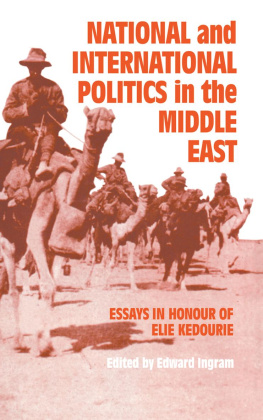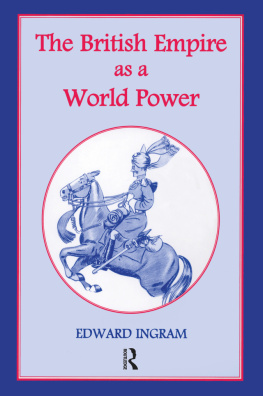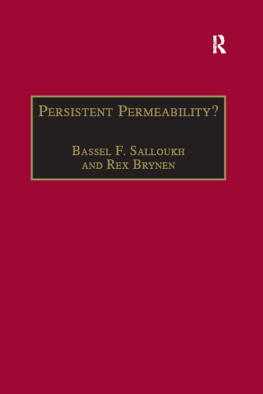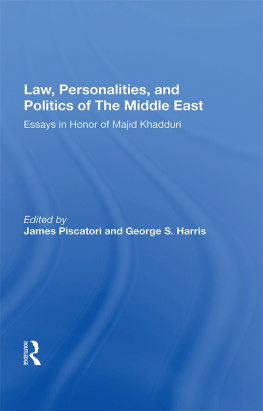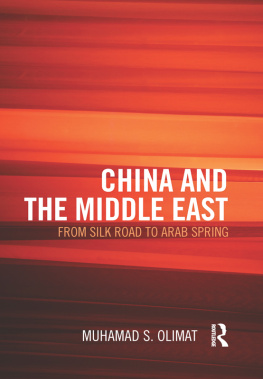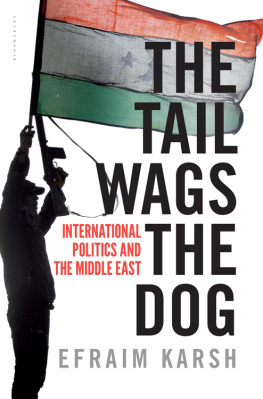NATIONAL AND INTERNATIONAL POLITICS IN THE MIDDLE EAST
By the same author:
IN DEFENCE OF BRITISH INDIA:
GREAT BRITAIN IN THE MIDDLE EAST, 1775-1842
COMMITMENT TO EMPIRE: PROPHECIES OF THE GREAT GAME IN ASIA, 1797-1800
THE BEGINNING OF THE GREAT GAME IN ASIA, 1828-1834
As editor:
TWO VIEWS OF BRITISH INDIA: THE PRIVATE CORRESPONDENCE OF MR. DUNDAS AND LORD WELLESLEY, 1798-1801
First published 1986 by
FRANK CASS AND COMPANY LIMITED
Published 2013 by Routledge
2 Park Square, Milton Park, Abingdon, Oxon OX14 4RN
711 Third Avenue, New York, NY, 10017, USA
Routledge is an imprint of the Taylor & Francis Group, an informa business
Copyright 1986 Frank Cass & Co. Ltd.
British Library Cataloguing in Publication Data
National and international politics in the Middle East: essays in honour of Elie Kedourie.
1. Near EastPolitics and government
I. Kedourie, Elie II. Ingram, Edward, 1940
956 DS62.8
All rights reserved. No part of this publication may be reproduced, stored in a retrieval system, or transmitted in any form, or by any means, electronic, mechanical, photocopying, recording, or otherwise, without the prior permission of the publisher.
ISBN 13: 978-0-714-63278-0 (hbk)
Cover photograph: The Imperial Camel Corps Brigade outside Beersheba, November 1917. By permission of the Trustees of the Imperial War Museum, London.
Elie Kedourie, F.B.A., Professor of Politics in the University of London, is sixty years old. In celebration of his birthday, these essays are presented to him by a group of his admirers overseas. None of his colleagues will be found among the authors and only one of his students. Likewise, only one of us is a close friend. Some of us have met him occasionally, many of us never: all, however, are great admirers of his work. Historians ought to be known and ought to be able to be known by their work rather than their personalities. Too many reputations in North America and, one suspects, in Great Britain are founded upon hustle around conferences and commissions. Professor Kedourie is known for his unforgettable essays, for the pattern of interpretation and view of the world which hold his readers spellbound, even when they strongly disagree with his opinions, and for Middle Eastern Studies, which recently reached its majority and which he and Frank Cass together have turned into the foremost scholarly journal in its field. Some of us have had the honour and good fortune to be published in it. I am one.
Anyone who meets Professor Kedourie as the result of submitting a manuscript to Middle Eastern Studies, can attest to the pleasure of receiving the two short sentences he writes (more quickly than other editors) to tell one that he has enjoyed reading ones work and will be pleased to publish it. What he says upon turning one down I am boastful enough to claim not to know. I sent to him the first article I wrote, a study of a British expedition to the Red Sea during the war of the Second Coalition. The moment he accepted the article, I became bold. Rose Louise Greaves, another of my favourite historians, had recently published a series of articles in the Bulletin of the School of Oriental and African Studies on Anglo-Iranian relations before the First World War. Dreaming of following her example, I sent Professor Kedourie three more parts of my article. To my delight, he accepted them. I drew the only reasonable conclusion: that the Great Game in Asia had been invented to keep me scribbling happily throughout my career.
A meeting with Professor Kedourie can be an ordeal, not always, but sometimes. I have met him on six occasions. About ten years ago, when we had not yet met, he accepted an invitation to lunch in a small, noisy Italian restaurant I was fond of at the bottom of Charing Cross Road it does sound unlikely but once upon a time the food there was delicious. Nowhere less suitable for this meeting, however, could be imagined. He sat quietly, almost hesitantly, so effectively giving the impression that I was paying him the compliment in coming, rather than he me, that I became tongue-tied with fright. Going to his house for dinner for the first time while on leave in London last year was just as unnerving. I was the only guest and made so welcome that I stayed far too late. So where lurked the peril? Mrs. Kedourie, of course. Imagine oneself chattering away light-heartedly, between times chewing the walnuts she has cracked with a nut-cracker whose secret is known only to the family, when a word misplaced transforms ones smiling hostess before ones very eyes into the formidable intellect of Sylvia Haim. Foul, one wants to cry. Begin the conversation again. But I cannot have disgraced myself. They were kind enough to ask me back.
Just as Professor Kedourie gave me my first success, he gave me one of the most enjoyable moments of my career. An eminent (to be gracious) American historian, who shall here go nameless, was reviewing one of my books and evidently disliked the tone of it. But what else was to be expected, he asked, from a disciple of Elie Kedourie? Though technically not a disciple (to my regret, nobody sent me to see him while I was attending the London School of Economics), I am happy to be known as one. Professor Kedourie is, as I warned him at the time, now stuck with me, and will, I hope, therefore accept these essays as a token of the enjoyment his essays have always given to me.
Acknowledgements are due to the British Library, the Public Record Office, the Imperial War Museum, the Bundesarchiv and the Politisches Archiv des Auswrtigen Amts of the Federal Republic of Germany, the Israel State Archives, the United States National Archives, Di-Ileri Bakanlii Hazane-i Evrak, the National Library of Wales, the Hereford Record Office, Kings College London, St. Antonys College, Oxford, the University of Durham Library, Cambridge University Library, the Bodleian Library, and the Royal Geographical Society, for the use of material from their collections.
Four friends and colleagues have given freely of their time and advice in helping to prepare this volume. William L. Cleveland atoned for his sinful delight in the fall of the British Empire by sharing his understanding of the modern Middle East. Ruth Baldwin and Terence J. Ollerhead of The International History Review

